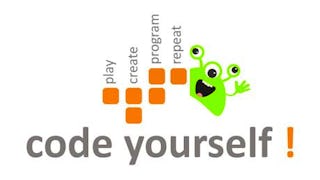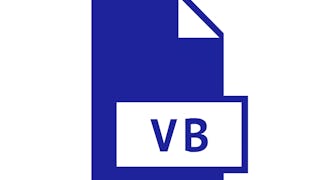This course offers a comprehensive introduction to programming using flowcharts and pseudocode, ideal for anyone new to programming. You'll gain a solid understanding of key programming concepts like variables, operators, conditional statements, loops, functions, and more. By the end of the course, you’ll be able to visualize logic and translate it into simple pseudocode that can be used in any programming language.

Entdecken Sie neue Fähigkeiten mit 30% Rabatt auf Kurse von Branchenexperten. Jetzt sparen.


Fundamentals of Programming Using Flowchart and Pseudocode

Dozent: Packt - Course Instructors
Bei  enthalten
enthalten
Empfohlene Erfahrung
Was Sie lernen werden
Master how to create flowcharts and pseudocode for programming logic.
Understand different variable types and how to use them in coding.
Learn how to implement conditional logic using if-else and switch statements.
Gain proficiency in using loops and functions for efficient coding.
Kompetenzen, die Sie erwerben
- Kategorie: Computational Logic
- Kategorie: Pseudocode
- Kategorie: Computer Programming
- Kategorie: Graphical Tools
- Kategorie: Software Visualization
- Kategorie: Debugging
- Kategorie: Programming Principles
Wichtige Details

Zu Ihrem LinkedIn-Profil hinzufügen
Mai 2025
8 Aufgaben
Erfahren Sie, wie Mitarbeiter führender Unternehmen gefragte Kompetenzen erwerben.

In diesem Kurs gibt es 9 Module
In this module, we will introduce you to the course layout and objectives, providing a roadmap of what you'll learn. You'll also gain an understanding of programming, software development, and how flowcharts and pseudocode are essential for solving programming problems.
Das ist alles enthalten
2 Videos1 Lektüre
In this module, we will guide you through the installation of diagrams.net and Notepad++, tools essential for creating flowcharts and writing pseudocode. You'll learn the basics of flowchart creation, explore the role of pseudocode in programming, and practice writing pseudocode through hands-on assignments.
Das ist alles enthalten
6 Videos1 Aufgabe
In this module, we will introduce you to the concept of variables, including the different types such as integers, floats, booleans, characters, and strings. You'll explore how to declare and use these variables correctly through examples and assignments. Additionally, we will discuss the importance of keywords in programming and how to avoid common pitfalls.
Das ist alles enthalten
12 Videos1 Aufgabe
In this module, we will explore the fundamentals of operators, detailing their importance in programming. You'll learn about the different types of operators, such as arithmetic, relational, and logical, and see how they are applied through examples.
Das ist alles enthalten
1 Video1 Aufgabe
In this module, we will cover the essential concept of conditional statements, which determine the flow of a program. You’ll explore different types of conditionals, including If, If-Else, Nested If-Else, and Switch statements, with practical examples and assignments. We’ll also provide tips to enhance your use of conditional logic for efficient coding.
Das ist alles enthalten
10 Videos1 Aufgabe
In this module, we will introduce you to loops, one of the most powerful constructs in programming. You’ll learn about the different types of loops available and how to use them effectively. We’ll also share key tips for optimizing your use of loops to write more efficient and reliable code.
Das ist alles enthalten
3 Videos1 Aufgabe
In this module, we will explore the concept of functions, a fundamental programming construct. You'll learn what a function signature is and how it defines a function’s structure. Additionally, we will cover the two main types of functions in programming, helping you understand their roles and applications.
Das ist alles enthalten
3 Videos1 Aufgabe
In this module, we will cover the role of comments in programming, explaining why they are essential for writing clear and understandable code. You’ll learn about the different types of comments and see examples of how to use them in your code for better organization and documentation.
Das ist alles enthalten
2 Videos1 Aufgabe
In this module, we will introduce you to exceptions, a critical aspect of error handling in programming. You'll learn about the different types of exceptions and their significance, as well as how they help you manage errors effectively in your code.
Das ist alles enthalten
1 Video1 Aufgabe
Erwerben Sie ein Karrierezertifikat.
Fügen Sie dieses Zeugnis Ihrem LinkedIn-Profil, Lebenslauf oder CV hinzu. Teilen Sie sie in Social Media und in Ihrer Leistungsbeurteilung.
Dozent

von
Mehr von Algorithms entdecken
 Status: Vorschau
Status: VorschauThe University of Edinburgh
 Status: Kostenloser Testzeitraum
Status: Kostenloser TestzeitraumLearnQuest
 Status: Kostenloser Testzeitraum
Status: Kostenloser TestzeitraumDuke University
 Status: Vorschau
Status: VorschauBall State University
Warum entscheiden sich Menschen für Coursera für ihre Karriere?





Neue Karrieremöglichkeiten mit Coursera Plus
Unbegrenzter Zugang zu 10,000+ Weltklasse-Kursen, praktischen Projekten und berufsqualifizierenden Zertifikatsprogrammen - alles in Ihrem Abonnement enthalten
Bringen Sie Ihre Karriere mit einem Online-Abschluss voran.
Erwerben Sie einen Abschluss von erstklassigen Universitäten – 100 % online
Schließen Sie sich mehr als 3.400 Unternehmen in aller Welt an, die sich für Coursera for Business entschieden haben.
Schulen Sie Ihre Mitarbeiter*innen, um sich in der digitalen Wirtschaft zu behaupten.
Häufig gestellte Fragen
Yes, you can preview the first video and view the syllabus before you enroll. You must purchase the course to access content not included in the preview.
If you decide to enroll in the course before the session start date, you will have access to all of the lecture videos and readings for the course. You’ll be able to submit assignments once the session starts.
Once you enroll and your session begins, you will have access to all videos and other resources, including reading items and the course discussion forum. You’ll be able to view and submit practice assessments, and complete required graded assignments to earn a grade and a Course Certificate.
Weitere Fragen
Finanzielle Unterstützung verfügbar,

